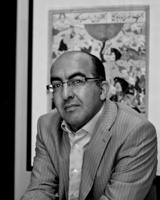Asghar Seyed-Gohrab, born in Tehran, Iran, in 1968. Ph.D. from Leiden University. Associate Professor of Persian and Iranian Studies at Leiden University.
Fellow (1 September 2013 – 31 January 2014)
OF POETRY AND POLITICS: CLASSICAL POETIC CONCEPTS IN NEW POLITICS OF TWENTIETH CENTURY IRAN
Research Question
How is classical literary tradition used in a varied range of political contexts? How is poetry used to justify violence in twentieth-century Iran?
Project Description
Poetry’s central role in Persian identity has been recognized, but there has been little detailed study of the way it actually functions in society and everyday life. My research examines how medieval poetic and mystic concepts are utilized to comment on new politics in Iran. Three central episodes of this century are studied. During Constitutional Revolution (1905-11), poetry became a vehicle for introducing ‘Western’ social and political ideas. During the Islamic Revolution, Khomeini used poetry to express his spiritual ideals, and his political theory. During the Iran-Iraq war, poetry became part of the state propaganda using the combatant cult of martyrdom as an icon of national identity to justify violence, giving meaning to death.
Selected Publications
1) (2012) The Great Umar Khayyam: A Global Reception of the Rubáiyat, Leiden: Leiden University Press.
2) (2012) Metaphor and Imagery in Persian Poetry, Leiden/Boston: Brill.
3) (2012) “No Reward – Martyrdom as Piety, Mysticism […] in Iran,” in Der Islam: Zeitschrift für Geschichte und Kultur des islamischen Orients, 1-2, 87, pp. 248-73.
